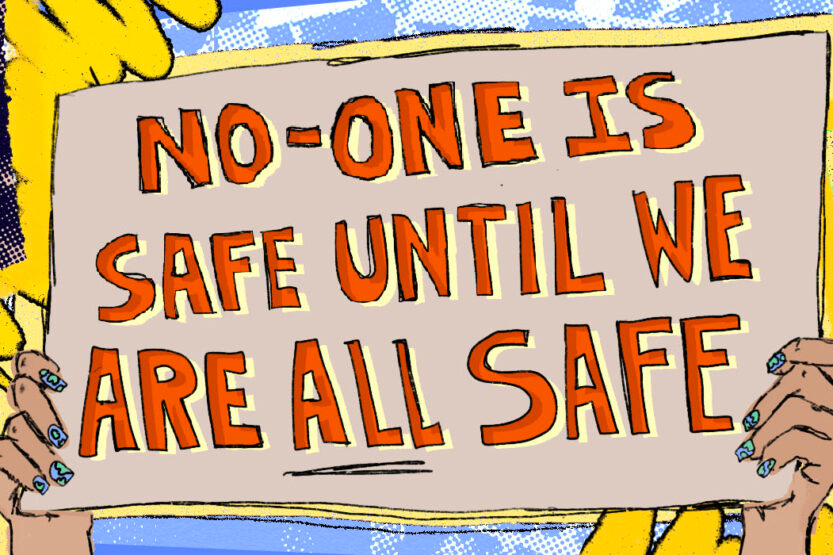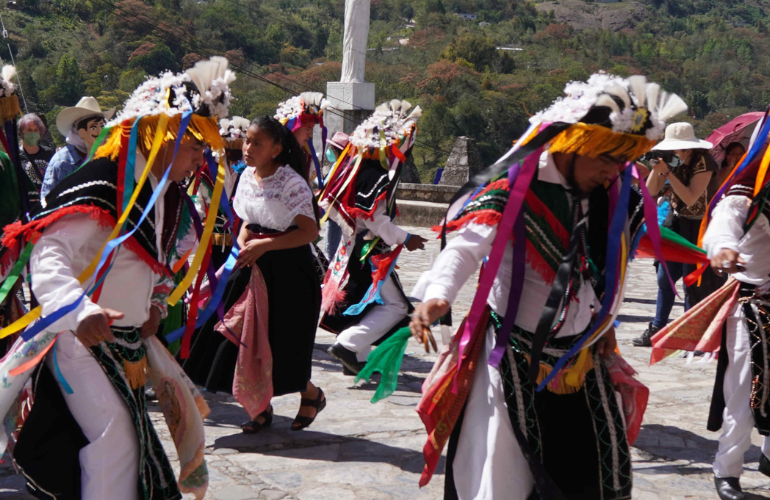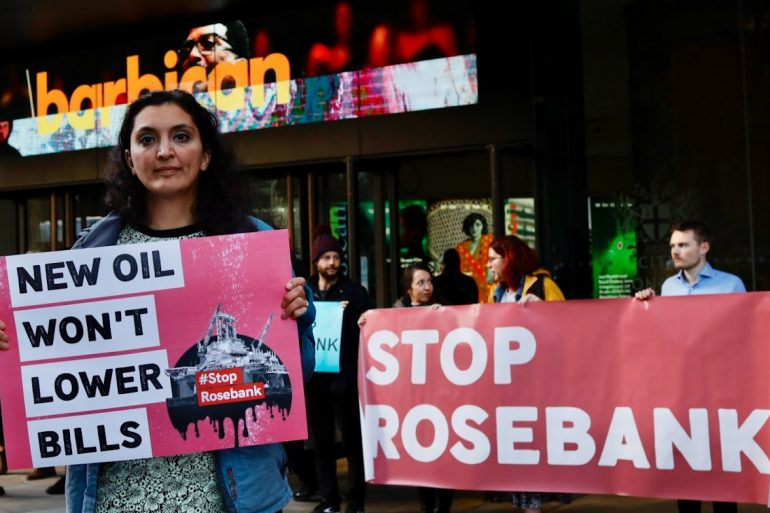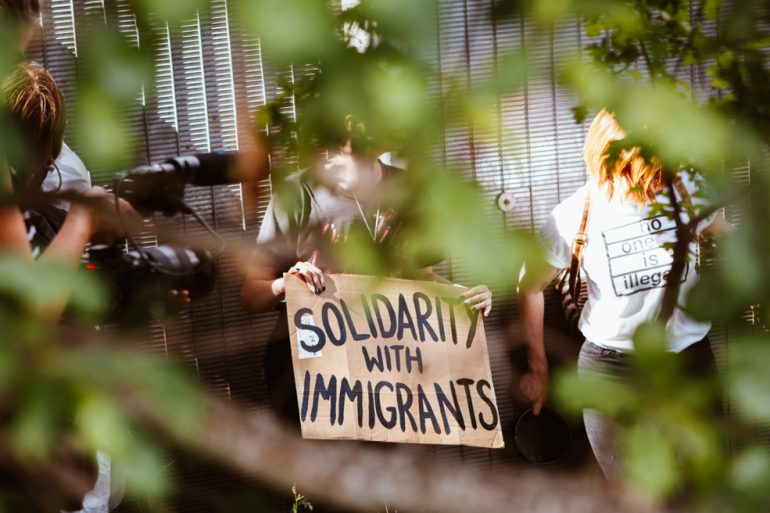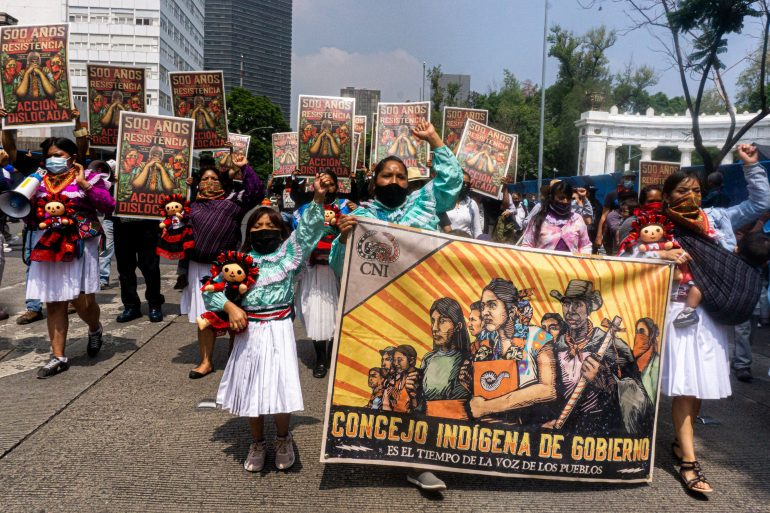On the morning of 17th April, Indian diaspora activists staged a “crime scene” and sealed off Meta’s London headquarters located on Euston Road. Activists have accused Meta for “crimes against democracy” for the company’s failure to protect election integrity in India. About a billion Indians are set to vote in national elections beginning 19th April.
As employees arrived for work, they were met by protesters outside dorning forensics suits, who had sealed off the entrance to the building with blue and white incident tape. Once the entrance was sealed, protesters went on to stand in front of the building with banners and a huge poster that said ‘Zuck Profits From Hate.’

Having been alerted about the protest beforehand, I stationed myself outside a cafe nearby, with a clear view of the building entrance. I met up with one of the organisers there, who was receiving updates on the movement of the protestors. Security was particularly high that day, so organisers were extra cautious to not have cameras or equipment visible. I hid my camera in the bag and waited.
Around 10:10am, one of the co-organisers, who was sat next to me, signalled that protestors were on the move. And within minutes, I could see a stream of people march in with white suits.
I quickly got my camera out and headed to the building entrance. So did a security person who managed to spot the protestors at a distance. Within minutes, the activists had occupied the space, and a dozen or so security personnel stationed themselves around the protest site. The building went into lockdown, and gates were locked from inside.
The protest, led by The London Story, along with India Labour Solidarity, InSAF India, UK Indian Muslim Council and Hindus for Human Rights UK, saw around a dozen activists come together to demand that Meta do better when it comes to hate and disinformation online.
“Meta has shown it can implement guard rails to protect democracy during US elections,” says Praveen Kolluguri, one of the protesters. “We’re asking for similar rules to be extended to India to prevent serious harms during the election. With our action, we want to make it clear that Meta can’t get away with treating Global South democracies like India with contempt. Meta should stop prioritising profit and do the right thing.”
While Meta placed a bunch of election integrity measures in the run up to the 2020 US Elections, it does look like they aren’t enacting any meaningful measures with regards to protecting the integrity of Indian elections; or in cases where they have claimed to put in measures, they are inadequate.
Activists ask Meta to clean up its act and meet their demands
The protestors have three demands:
- They want Meta to “stop all paid political advertising during India’s election silence period”. Election laws in the country dictate that a 48-hour silence period be maintained prior to voting, which is a period when political parties and candidates are not allowed to campaign and there is to be a pause in media coverage of election matters. So protestors are requesting Meta to ensure its platforms are not used to push political ads to voters during this time.
- The protestors want the company to “turn off behavioural profiling in the recommendations system by default”, in order to lessen the effects of polarised content on people’s feeds.
- Protesters want the company to “provide meaningful transparency on the source of funding for all political advertisements.” As a recent BOOM Live investigation showed, in the last four months, a shadow network of pro-BJP pages has spent ₹20 million ($239,000 USD) on political ads on Meta, several of which feature hate speech, disinformation and propaganda.

The Bharatiya Janata Party (BJP) is the political party in power in India’s central government. The party, led by Prime Minister Narendra Modi, is known for furthering Hindutva, which is a Hindu nationalistic ideology that targets religious minorities in the country, particularly Muslims. This kind of hate and disinformation associated with religious minorities was what was seen predominantly in the content put out by these shadow networks.
Another research report, newly published, adds further weight to these findings and shows the true scale of shadow operations on Facebook.
According to Ekō, Foundation London Story and India Civil Watch International, ₹83.5 million ($1 million USD) has been spent on shadow advertising on Meta in the last 3 months by far-right pages, putting out pro-BJP content and targeting minorities and opposition political parties. This accounts for about 22% of all political ads run in India in that time, and more than the BJP’s official campaign spend on the platform.
But the issue of shadow political advertising is not new. A 2022 investigation from Reporters Collective and ad.watch showed that over a period of two years the BJP secretly funded several ghost and surrogate advertisers on Meta to target the opposition in various state elections at the time, spending ₹58.3 million, getting 1.31 billion views. In contrast, the main opposition party, the Congress, spent ₹2.3 million, less than 4% of what the BJP spent.
This not only shows that there is no level playing field when it comes to campaigning online, but also that voters are being fed information (including hate and disinformation) from political parties without knowing the source of this information.
This is particularly concerning during election time because not only will candidates be able to go over campaign spending limits by making it seem like these ads are coming from independent pages, but also because voters are being manipulated by a compromised information space.
Meta’s larger hate problem
Speaking about the need to actively remove the hate and disinformation online, Rajiv Sinha, UK organiser for Hindus for Human Rights tells me: “It is also in violation of Indian domestic election period law. It’s as simple as that. Meta needs to abide by law. Needs to abide by its own rules and own policies that it has put in place.”
The Election Commission of India (ECI) has guidelines in place that require ads to go through “precertification” before they are put out. This applies for social media as well. And, through the Model Code of Conduct, it also says that ads that attack on the grounds of religion among other things are not allowed in the election period.
“Facebook takes money to amplify posts which call for people to be killed, which demean and demonise Muslims and which sow disinformation. It took two years for Facebook to remove a post from a prominent Hindu priest saying he wanted to ‘eliminate Muslims and Islam from the face of the Earth.’ It had 32 million views. How many minds are being warped by posts like that?,” said Lotika Singha, one of the protesters and co-chair of InSAF India.
For protestors like Lotika, the issue is not limited to this election alone. They are worried about the use of social media platforms to target minorities and other vulnerable groups at large.
Subscribe to shado's weekly newsletter
Exclusive event news, job and creative opportunities, first access to tickets and – just in case you missed them – our picks of the week, from inside shado and out.

“As members of the Indian diaspora, we are outraged at Meta’s lack of action about its devastating impact in India. With India’s elections starting this week, we are sounding the alarm bells: Meta must act urgently and enforce a silence period during the election,” they say.
When I asked why this action has targeted Meta in particular Rajiv says, “Meta is so pervasive and everyone uses it so much, particularly in India.”
“Meta is often the first in the industry to set policies and then other Big Tech companies tend to follow,” he adds. He hopes that this triggers better action on part of all social media platforms that operate in India.
While India’s social media problem is bigger than Meta, the company has a particularly problematic and cosy relationship with the government in power. This adds to the worry since citizens are not just fighting US-based social media companies but also draconian information laws that the country’s government has in place. So while a lot of the harmful content is allowed to flourish on the platforms, legitimate criticism gets censored, skewing the online conversation very much.
Asked if Meta is simply a company operating in India, and how it should respond if the laws put in place by the Indian government are inadequate or enable a certain politics, Rajiv says: “Withdraw from India in that case!” He continues: “Are platforms happy to profit from what comes from that? Exactly why our flyers and the banner say Zuck profits from hate.”
Last month, Meta released a statement titled Preparing For Indian General Elections 2024. In the statement they said they were going to monitor disinformation online, by making use of independent fact-checking partners and that they were going to label AI content. In the statement, they also claimed they already “provided industry-leading transparency for ads about social issues, elections or politics.”
But as investigations into shadow advertising networks have shown, these measures are riddled with loopholes. These shadow pages often link up to empty websites and fake phone numbers, so despite being verified by Meta, users have no transparency about the exact origins of these pages and who funds them.
Asked about what he thought of Meta’s statement and efforts it claims it is making towards protecting Indian elections, Praveen says, “I think it was just window dressing to protect themselves and they still continue to benefit from hate.”
Meta have not responded at all to the organisers’ demands yet, or even reached out to have a conversation. This though keeps with the trend of company’s inaction when it comes to tackling hate and disinformation in India for years.
After coming under a lot of pressure previously for the proliferation of hate speech and real-world violence that resulted from such hate in India, the company sanctioned an independent human rights assessment to look into this. Meta first delayed publishing this report, and then released a PR-looking summary of it that did not give out any details of the actual findings. To this day, the full report has not been released. This should sum up Meta for anyone.
What can you do?
- Support the 10-point plan: Indian Elections: Diaspora occupy Meta HQ over failures to address hate
- Accounts to follow for more on this and similar action & work
- For investigations related to India’s digital space, check out BOOM Live
- For investigations related to India’s political space and governance at large, check out Reporters’ Collective
- Mini documentary on the subject of hate speech and Meta in India: Web Of Hate
- Read more about how big tech is linked to oppression in Palestine




